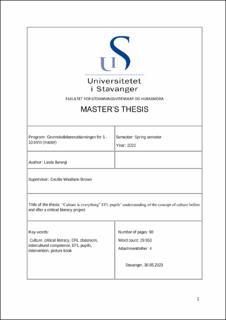| dc.description.abstract | Abstract
The current study centres around the topics culture and critical literacy. The aim of the thesis was to investigate the understanding of the concept of culture among year 5 EFL pupils and determine whether and how their understandings changed after a critical literacy project. To the researcher’s knowledge, no prior studies have examined the pupils’ perspective on the concept of culture.
The study involved conducting a critical literacy intervention, which was pre-planned utilising the instructional model of critical literacy proposed by Lewison et al. (2015). The intervention consisted of eight lessons conducted in three classes over a four-week period. Data was collected from pre- and post-groups interviews and learner artifacts from the critical literacy intervention. The interviews consisted of interview tasks and semi-structured interviewed question. A total of 35 pupils agreed to participate in the study, and learner artifacts were collected from 7 groups formed by the consenting pupils. There were three interview groups, one representing each class, consisting of four to five participants in each group. The data obtained were analysed thematically, and Nvivo software was used to categorise the data into five main themes.
The study findings revealed that the pupils’ initial understandings of the concept of culture were primarily centred around cultural artifacts. Moreover, culture was significantly perceived as being connected countries, and there was a highlighting of historical aspects related to Norwegian national culture. However, the post-interviews demonstrated a positive shift in the pupils’ understanding of culture, recognising it as a dynamic phenomenon that is constantly changing. Additionally, participants acknowledge that culture extends beyond a specific country, acknowledging the view of culture being made up of countless human groupings that can be seen as ‘small cultures’. Furthermore, during the post-interviews, there was also a significant emphasis on culture with the everyday life as a prominent theme. Both the pre-and post-interviews reported that the pupils’ reflected on cultural disrespect by providing examples related to real-life problems. Overall, the post-interviews revealed that the pupils embraced the cultural views promoted by the critical literacy project, and it is argued that this can contribute to their development of intercultural competence. | |
